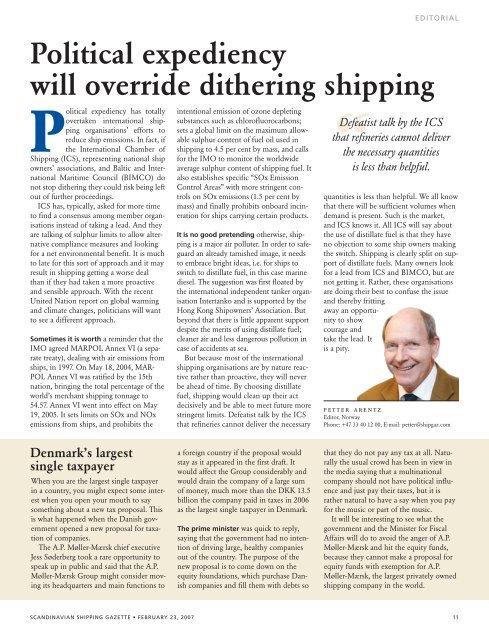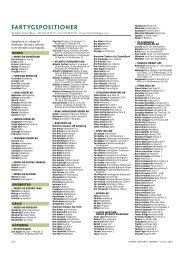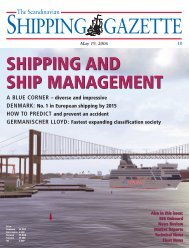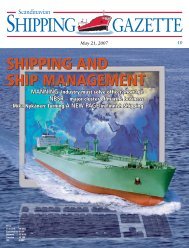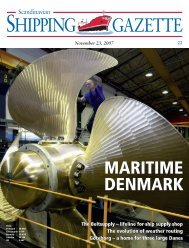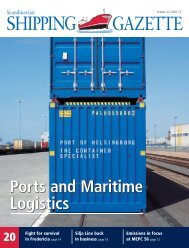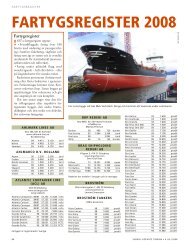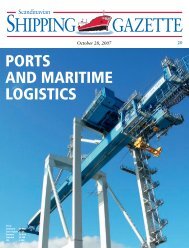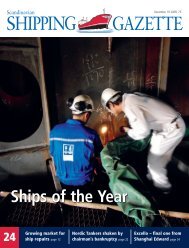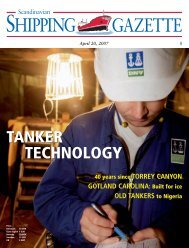SSG No 4 - Shipgaz
SSG No 4 - Shipgaz
SSG No 4 - Shipgaz
Create successful ePaper yourself
Turn your PDF publications into a flip-book with our unique Google optimized e-Paper software.
Political expediency<br />
will override dithering shipping<br />
Political expediency has totally<br />
overtaken international shipping<br />
organisations’ efforts to<br />
reduce ship emissions. In fact, if<br />
the International Chamber of<br />
Shipping (ICS), representing national ship<br />
owners’ associations, and Baltic and International<br />
Maritime Council (BIMCO) do<br />
not stop dithering they could risk being left<br />
out of further proceedings.<br />
ICS has, typically, asked for more time<br />
to find a consensus among member organisations<br />
instead of taking a lead. And they<br />
are talking of sulphur limits to allow alternative<br />
compliance measures and looking<br />
for a net environmental benefit. It is much<br />
to late for this sort of approach and it may<br />
result in shipping getting a worse deal<br />
than if they had taken a more proactive<br />
and sensible approach. With the recent<br />
United Nation report on global warming<br />
and climate changes, politicians will want<br />
to see a different approach.<br />
Sometimes it is worth a reminder that the<br />
IMO agreed MARPOL Annex VI (a separate<br />
treaty), dealing with air emissions from<br />
ships, in 1997. On May 18, 2004, MAR-<br />
POL Annex VI was ratified by the 15th<br />
nation, bringing the total percentage of the<br />
world’s merchant shipping tonnage to<br />
54.57. Annex VI went into effect on May<br />
19, 2005. It sets limits on SOx and NOx<br />
emissions from ships, and prohibits the<br />
Denmark’s largest<br />
single taxpayer<br />
When you are the largest single taxpayer<br />
in a country, you might expect some interest<br />
when you open your mouth to say<br />
something about a new tax proposal. This<br />
is what happened when the Danish government<br />
opened a new proposal for taxation<br />
of companies.<br />
The A.P. Møller-Mærsk chief executive<br />
Jess Søderberg took a rare opportunity to<br />
speak up in public and said that the A.P.<br />
Møller-Mærsk Group might consider moving<br />
its headquarters and main functions to<br />
intentional emission of ozone depleting<br />
substances such as chlorofluorocarbons;<br />
sets a global limit on the maximum allowable<br />
sulphur content of fuel oil used in<br />
shipping to 4.5 per cent by mass, and calls<br />
for the IMO to monitor the worldwide<br />
average sulphur content of shipping fuel. It<br />
also establishes specific “SOx Emission<br />
Control Areas” with more stringent controls<br />
on SOx emissions (1.5 per cent by<br />
mass) and finally prohibits onboard incineration<br />
for ships carrying certain products.<br />
It is no good pretending otherwise, shipping<br />
is a major air polluter. In order to safeguard<br />
an already tarnished image, it needs<br />
to embrace bright ideas, i.e. for ships to<br />
switch to distillate fuel, in this case marine<br />
diesel. The suggestion was first floated by<br />
the international independent tanker organisation<br />
Intertanko and is supported by the<br />
Hong Kong Shipowners’ Association. But<br />
beyond that there is little apparent support<br />
despite the merits of using distillate fuel;<br />
cleaner air and less dangerous pollution in<br />
case of accidents at sea.<br />
But because most of the international<br />
shipping organisations are by nature reactive<br />
rather than proactive, they will never<br />
be ahead of time. By choosing distillate<br />
fuel, shipping would clean up their act<br />
decisively and be able to meet future more<br />
stringent limits. Defeatist talk by the ICS<br />
that refineries cannot deliver the necessary<br />
a foreign country if the proposal would<br />
stay as it appeared in the first draft. It<br />
would affect the Group considerably and<br />
would drain the company of a large sum<br />
of money, much more than the DKK 13.5<br />
billion the company paid in taxes in 2006<br />
as the largest single taxpayer in Denmark.<br />
The prime minister was quick to reply,<br />
saying that the government had no intention<br />
of driving large, healthy companies<br />
out of the country. The purpose of the<br />
new proposal is to come down on the<br />
equity foundations, which purchase Danish<br />
companies and fill them with debts so<br />
EDITORIAL<br />
Defeatist talk by the ICS<br />
that refineries cannot deliver<br />
the necessary quantities<br />
is less than helpful.<br />
quantities is less than helpful. We all know<br />
that there will be sufficient volumes when<br />
demand is present. Such is the market,<br />
and ICS knows it. All ICS will say about<br />
the use of distillate fuel is that they have<br />
no objection to some ship owners making<br />
the switch. Shipping is clearly split on support<br />
of distillate fuels. Many owners look<br />
for a lead from ICS and BIMCO, but are<br />
not getting it. Rather, these organisations<br />
are doing their best to confuse the issue<br />
and thereby fritting<br />
away an opportunity<br />
to show<br />
courage and<br />
take the lead. It<br />
is a pity.<br />
petter arentz<br />
Editor, <strong>No</strong>rway<br />
Phone: +47 33 40 12 00, E-mail: petter@shipgaz.com<br />
that they do not pay any tax at all. Naturally<br />
the usual crowd has been in view in<br />
the media saying that a multinational<br />
company should not have political influence<br />
and just pay their taxes, but it is<br />
rather natural to have a say when you pay<br />
for the music or part of the music.<br />
It will be interesting to see what the<br />
government and the Minister for Fiscal<br />
Affairs will do to avoid the anger of A.P.<br />
Møller-Mærsk and hit the equity funds,<br />
because they cannot make a proposal for<br />
equity funds with exemption for A.P.<br />
Møller-Mærsk, the largest privately owned<br />
shipping company in the world.<br />
SCANDINAVIAN SHIPPING GAZETTE • FEBRUARY 23, 2007 11


